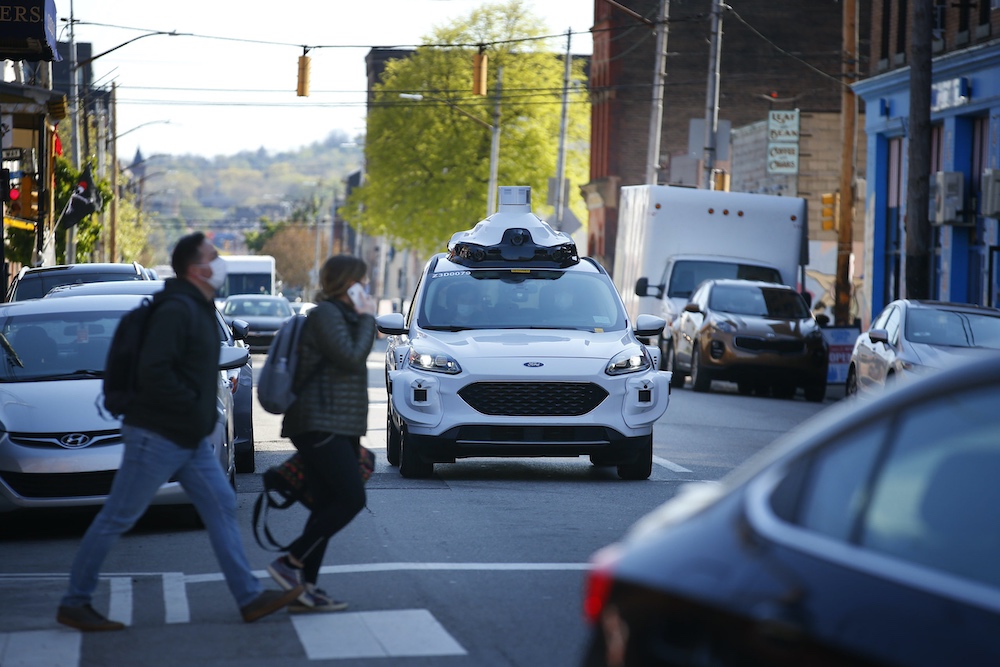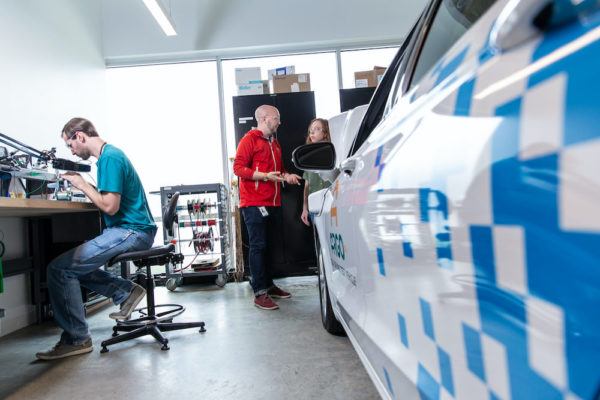2022 was going to be the year Argo AI pushed the peddle to the floor.
Speaking at an autonomous vehicle summit in June of 2021, CEO and founder Bryan Salesky announced: “We’re looking forward to an IPO within the next year.” Argo was in the race to be the first publicly traded self-driving car company.
Volkswagen had recently put $2.6 billion in the Strip District-based company. VW and Ford both held 42% ownership interest. Citigroup and JPMorgan Chase were leading a new round of private investment. The five-year-old company was valued at more than $7 billion.
Argo also seemed to be ahead of other companies in the technological race. It had developed its own LIDAR sensor, able to spot objects further away than most such systems can, giving it an edge to appeal to the local safety authorities that give self-driving cars a green light. Argo-driven cars were deployed to the streets of Austin and Miami.
So dozens of Argo employees may have been surprised to get pink slips last week.
A spokesperson for Argo confirmed to Technical.ly that 150 staffers — from a total of 2,000 — were laid off. The company previously stated that about 800 of its employees work in Pittsburgh. According to LinkedIn posts of those newly laid off, many worked in recruiting or human resources.
In addition to the layoffs, Argo is shutting down its office in Washington, DC, where it had planned to launch a fleet of autonomous vehicles to shuttle people around the capital, another milestone that never came to pass.
The company responded to an interview request from Technical.ly with the following statement: “With incredible growth and progress made in our mission to deploy driverless vehicles, we are making prudent adjustments to our business plan to best continue on a path for success.”
So what might be happening at Argo, one of the tech companies saddled with lofty expectations that it will help thrust Pittsburgh into the competitive tech economy in the coming decades?
Layoffs mean adjusted expectations
In the mid-2010s, many autonomous vehicle companies predicted that a “Total Recall”-esque cityscape of self-driving taxis was just a few years away. They beefed up staff in response and have had to step back as predictions do not come to pass, according to Sam Abuelsamid, the principal analyst for e-mobility at the Detroit-based marketing research firm Guidehouse Insights.
“Over the last several years, everybody has come to the realization that the problem of actually commercializing automated driving technology is actually a lot harder than they thought,” Abuelsamid told Technical.ly. “And it’s taking longer. And nobody is able to scale this up. Nobody has even gotten to the point where they can generally apply this everywhere.”

AI Argo in the Strip District in April 2021. (Photo by Jared Wickerham for AI Argo)
Local safety authorities remain weary, so autonomous vehicles never had the one successful rollout in a city that quickly launched them over the country. Billions in investor cash can keep these companies afloat for a while, but until they begin seeing profits, they are at risk for downsizing. (Another autonomous vehicle company, Mountain View’s Nuro, also announced layoffs last week.)
Argo was “more conservative” than other companies, Abuelsamid said, hoping to have its technology in mass use by 2021. “They expanded in the anticipation of being able to start scaling up some commercial programs this year,” he said, “and they’re just not quite ready for it.”
Support roles are often the first to go in such a housecleaning, he added. Recruiters and HR professionals provide help with hiring, expansion and managing of a larger staff. If the company is no longer expecting a large round of hiring, they are not needed in large numbers.
Will Argo AI still go public?
As for the IPO, it probably won’t happen this year, as the stock market is on downward trend, Abuelsamid said. 2024 is the soonest he would expect Argo to be publicly traded.
The layoffs may actually be a sign Argo’s top brass is still preparing for it, said Carla Bailo, president and CEO of the Center for Automotive Research.
“I would guess they’re cleaning up overhead expenses to then make their balance sheet stronger,” Bailo told Technical.ly. To many potential stock buyers, “if you have to too heavy on the administration side, that automatically begins to devalue you, because you’re not seen as being that efficient.”
Erik Gordon, a professor of business at the University of Michigan specializing in technology commercialization, is not so sure.
“Laying off five or ten percent of your people isn’t doesn’t affect your long-term prospects,” he told Technical.ly. “It doesn’t make your long term prospects look any better. So I doubt that it has anything to do with the IPO. But I think it has to do with over-optimism in the tech sector, in general.”

Argo AI’s Pete Rander, cofounder and president, and Bryan Salesky, founder and CEO. (Photo courtesy of Argo AI)
Tech entrepreneurs often see the future through rose-tinted glasses, Gordon said. That’s the mindset you need to spend years developing a product few people have ever used before.
“[You] have to be optimistic, almost insane, to have the emotional resilience to be a tech entrepreneur,” he said. “When you start to make some progress, it’s time this time to gear up, really hit the accelerator.” When that mindset meets reality, a company may need to be resized.
Layoffs like these are “not necessarily a sign that the company is having problems,” Gordon said. “It’s certainly not the first tech company to go through a shift like this.”
Argo is still in a healthy position, even if isn’t one of the top self-driving car companies, by funding or workforce — that honor goes to the likes of Cruise and Waymo, Bailo said: “I would put [Argo] in the next tier, just based on their visibility.”
And, Gordon said, Argo has an impressive technological edge that may be more important to investors than size or visibility:
“If I were an investor, I would not be thinking about who is biggest at this early stage,” he said. “I would just be looking very carefully at the technology, who is developing the best technology platform.”
Join the conversation!
Find news, events, jobs and people who share your interests on Technical.ly's open community Slack





